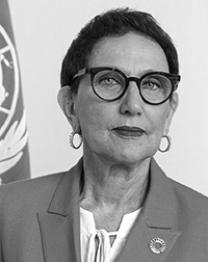Many developing countries were struggling to finance the investments required to meet the 2030 Agenda for Sustainable Development even before the coronavirus disease (COVID-19) crisis. Moreover, the debt obligations in developing countries, built up after the global financial crisis and coming to maturity over the next decade, have been further augmented by the economic recession, tightening the fiscal squeeze on many developing countries and threatening to derail the implementation of the 2030 Agenda altogether.
This situation is in part a consequence of the slow and uneven global recovery from the global financial crisis, but it also reflects decades of misguided adjustment programmes, premature capital account liberalization and insufficient levels of concessional multilateral finance that have hampered the mobilization of long-term development finance. In this environment, the rise in developing country total debt – public, private, domestic and external – to its highest level on record, at 193 per cent of combined developing country GDP in 2018, has largely been decoupled from productive investment and structural transformation in these economies.
Getting the Sustainable Development Goals back on track, most notably those requiring significant public investment, will depend on coordinated international support and policy responses to scale up reliable sources of public finance, including through debt instruments, and to ensure such financing is channelled into long-term developmental projects.
UNCTAD will bring together leading experts and policymakers for this event to exchange experiences, take stock of recent advancements and discuss further practical ways forward to boost long-term international finance and facilitate effective, transparent and fair sovereign debt restructurings, relief and crisis resolution as indispensable avenues to achieving the 2030 Agenda.
Key issues
- Financing for development. What is the current landscape regarding financing for development? What are the most pressing issues, including the debt situation of developing countries, in particular in small island developing States?
- Sovereign debt. What are the advantages and shortcomings of existing arrangements for debt financing and debt relief and for sovereign debt restructuring? Which are the different ways of mobilizing support for the establishment of a global, consensus-based and inclusive multilateral framework for debt treatment and restructuring?
- Global economic architecture. Can the existing institutions of global economic governance be reformed around the goals of shared responsibility and collective solutions or is a radical rethink needed? What are the missing institutions? What are the priorities for a reform of the international financial and debt architecture?
Participants
Introductory remarks:
- Ms. Rebeca Grynspan, Secretary-General, UNCTAD
Speakers:
- Ms. Mia Mottley, Prime Minister and Minister of Finance, Economic Affairs and Investment, Barbados
- Mr. Martín Guzmán, Minister of Economy, Argentina
- Ms. Nadia Calviño Santamaría, First Deputy Prime Minister and Minister of Economic Affairs and Digital Transformation, Spain
- Mr. Joseph Stiglitz, Professor, Columbia University, and Nobel Laureate
Moderator:
- Mr. Jonathan Wheatley, Financial Times
Watch recording of Roundtable I
Rebeca Grynspan, of Costa Rica, became UNCTAD's eighth Secretary-General on 13 September 2021 and is the first woman to lead the organization.
Prior to her UNCTAD appointment, she was the Ibero-American secretary-general from 2014 to 2021, also the first woman to head the organization. During her mandate, she has coordinated the 22-member Iberoamerican Conference and led four key summits of Heads of State and Government.
In 2010 she was appointed Under-Secretary-General of the United Nations and Associate Administrator of the United Nations Development Program (UNDP) and prior to that was UNDP Regional Director for Latin America and the Caribbean.
Prior to joining the United Nations, Ms. Grynspan served as Vice-President of Costa Rica from 1994 to 1998. She was also Minister of Housing, Minister Coordinator of Economic and Social Affairs, and Deputy Minister of Finance. In 2021 she was named Special International Advisor to the newly created Economic and Social Council of Argentina and invited to join as member of the G20 High-Level Independent Panel on Financing the Global Commons for Pandemic Preparedness and Response.
In addition to her experience as a lecturer and advisor to several international organizations, she has been actively involved in key United Nations initiatives, such as the Millennium Project's Task Force on Poverty and Economic Development and the High-level Panel on Financing for Development.
In 2014 and 2015, she was recognized as one of the 50 leading intellectuals of Latin America. And she was recognized as one of the 100 most powerful women in Central America by Forbes magazine.
Ms Grynspan holds a degree in Economics by the University of Costa Rica and a MSc in Economics by the University of Sussex. She has been awarded a Doctorate Honoris Causa by the University of Salamanca, the University of Extremadura and the European University of Madrid in recognition of her outstanding professional achievements.
The Honourable Mia Amor Mottley, Q.C., M.P., became Barbados' eighth and first female Prime Minister on 25 May 2018.
Ms. Mottley was elected to the Parliament of Barbados in September 1994 as part of the new Barbados Labour Party Government.
Prior to that, she served as one of two Opposition Senators between 1991 and 1994. One of the youngest persons ever to be assigned a ministerial portfolio, Ms. Mottley was appointed Minister of Education, Youth Affairs and Culture from 1994 to 2001.
She later served as Attorney General and Deputy Prime Minister of Barbados from 2001 to 2008 and was the first female to hold that position.
Ms. Mottley is an Attorney-at-law with a degree from the London School of Economics, specialising in advocacy. She is also a Barrister of the Bar of England and Wales.
In 2002, she became a member of the Local Privy Council. She was also admitted to the Inner Bar, becoming the youngest ever Queens Counsel in Barbados.
Martin Guzman is the current Minister of Economy of the Republic of Argentina.
He was a researcher at the Columbia University School of Business and Director of the Public Debt Restructuring Program of the Policy Dialogue Initiative of the same School. Together with Nobel laureate Joseph Stiglitz, he has directed the academic training program of the Columbia University Initiative for Policy Dialogue.
He is Full Professor at the Faculty of Economic Sciences of the National University of La Plata and Associate Professor at the Faculty of Economic Sciences of the University of Buenos Aires. Professor Guzman is also editor in chief of the Journal of Globalization and Development and has published numerous academic articles in specialized journals and books.
He graduated as a Doctor of Economics (PhD. In Economics) from Brown University, United States.
Ms. Nadia Calviño Santamaría is the First Deputy Prime Minister and Minister of Economic Affairs and Digital Transformation, Spain
Economist and legal expert, Ms. Calviño Santamaría was a lecturer in Political Science and the Financial System at the Complutense University of Madrid. Since April 2014, she has been Director-General of Budgets at the European Commission, responsible for multiyear financial planning, the annual budgets, accounting and the regulation of the EU Budget.
Previously, she held the position of Assistant Director-General for Financial Services and Assistant Director-General at the Directorate-General for Competition at the European Commission.
Before joining the European Commission in September 2006, Ms. Calviño Santamaría developed her professional career in the Spanish national administration as a State commercial technician and economist, holding various posts in the Ministry of Economy in the foreign trade, analysis and macro-economic department, economic policy department and defence of competition department. In this last field, she held the posts of Under-Director-General of Legal Affairs, Under-Director-General of Mergers and Director-General of Competition.
Joseph E. Stiglitz is an American economist and a professor at Columbia University. He is also the co-chair of the High-Level Expert Group on the Measurement of Economic Performance and Social Progress at the OECD, and the Chief Economist of the Roosevelt Institute. A recipient of the Nobel Memorial Prize in Economic Sciences (2001) and the John Bates Clark Medal (1979), he is a former senior vice president and chief economist of the World Bank and a former member and chairman of the (US president's) Council of Economic Advisers.
In 2000, Stiglitz founded the Initiative for Policy Dialogue, a think tank on international development based at Columbia University. He has been a member of the Columbia faculty since 2001 and received that university's highest academic rank (university professor) in 2003. In 2011 Stiglitz was named by Time magazine as one of the 100 most influential people in the world. Known for his pioneering work on asymmetric information, Stiglitz's work focuses on income distribution, risk, corporate governance, public policy, macroeconomics and globalization. He is the author of numerous books, and several bestsellers. His most recent titles are People, Power, and Profits, Rewriting the Rules of the European Economy, Globalization and Its Discontents Revisited, The Euro and Rewriting the Rules of the American Economy.






